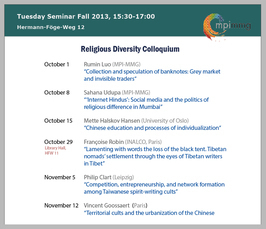"Competition, Entrepreneurship, and Network Formation among Taiwanese Spirit-Writing Cults"
Religious Diversity Colloquium Winter 2013/14
- Date: Nov 5, 2013
- Time: 03:30 PM - 05:00 PM (Local Time Germany)
- Speaker: Philip Clart (Leipzig)
- Philip Clart is Professor of Chinese Culture and History at the University of Leipzig, Germany. His main research areas are popular religion and new religious movements in Taiwan, religious change in Taiwan and China, as well as literature and religions of the late imperial period (10th-19th c.). His monographs include Han Xiangzi: The Alchemical Adventures of a Daoist Immortal (University of Washington Press, 2007) and Die Religionen Chinas (Vandenhoeck & Ruprecht, 2009). He has edited or co-edited Religion in Modern Taiwan: Tradition and Innovation in a Changing Society (University of Hawai‘i Press 2003), The People and the Dao: New Studies of Chinese Religions in Honour of Daniel L. Overmyer (Institute Monumenta Serica, 2009), and Chinese and European Perspectives on the Study of Chinese Popular Religions (Boyang Publishing, 2012).
- Location: MPI-MMG, Hermann-Föge-Weg 12, Göttingen
- Room: Conference Room

For more details please contact vdvoffice(at)mmg.mpg.de.
Spirit-writing cults (“phoenix halls,” luantang) have been a feature of the Taiwanese religious landscape since the 19th century. Their ritual focus are séances during which a possessed medium reveals written messages from the gods, either in response to questions posed by believers or as a way of composing texts of religious doctrine and moral edification. Until the middle of the 20th century, such cult groups were usually attached to community temples and thus functioned in a largely local context. While this community-based type of spirit-writing cult continues to operate in many (especially rural) areas to this day, beginning in the 1960s a new type of phoenix hall began to emerge that absorbed influences from popular redemptive societies such as the Way of Unity (Yiguandao). Such “sectarian” phoenix halls developed rapidly in many areas of Taiwan, with central Taiwan emerging as a particularly active area. The spread of such temples was aided by a continuous process of new cult groups splitting off from existing ones; as a result networks of phoenix halls formed across the island. The present paper seeks to make a contribution to the sociology of Taiwanese religions by pursuing three aims:
- to study the organizational dynamics conducive to this growth process (e.g. conflicts between institutional and charismatic sources of authority);
- to investigate the interrelationships of phoenix halls within the resulting networks (cooperation and competition, exchange of ideas and personnel);
- to compare these phenomena with (a) the “division of incense” (fenxiang) hierarchies among local temples, (b) the development patterns of traditional-style, community-based phoenix halls, and (c) the segmentation of redemptive societies.